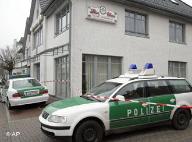Lawyer: Suspects in Restaurant Murder Deny Involvement
Police have arrested two suspects in the Sittensen Chinese restaurant killings, but the investigation is far from over, with three of the victims still to be identified.
The two Vietnamese men arrested in connection with the killings of seven people in a Chinese restaurant in Germany deny playing any role in the shootings, one of the men's lawyer said Thursday.
The pair, aged 29 and 31, whose full identities have not been made public, were arrested on Monday, 12 hours after the shootings. The murders took place in the early hours of Monday in the Lin Yue restaurant in the small town of Sittensen, situated between Bremen and Hamburg.
The bodies of three men and three women were found in the restaurant in the early hours of Monday. Another man found at the scene died of serious gunshot wounds on Tuesday.
The two suspects were apprehended when the hire car they were driving was stopped for a "routine check" near the northern city of Bremen.
Bail application
"My client has told me that he has nothing to do with this thing and neither has his friend," said Wilfried Behrendt, the lawyer representing the 31-year-old man.
Police refused to comment on press reports that the 31-year-old was known to police and had previously been investigated for criminal assault and blackmail.
Behrendt acknowledged that he had represented his client for several years, but gave no further details. The lawyer has applied for his client's release and believed a colleague representing the other man would do the some. Both suspects have been remanded in custody by a magistrate in the town of Wildeshausen.
The older suspect has lived for several years in a new apartment block surrounded by gardens at Osterholz on the outskirts of the city of Bremen, according to neighbors. They said the young suspect had recently moved into the block after living in the nearby town of Ahlhorn. Police have searched all the premises and said they had seized documents, but have released no other details.
Many unanswered questions
The process of identifying the bodies was completed on Thursday, with the identity of the three remaining victims established.
The killings have shocked the small community, and challenged local police. They have said all lines of investigation remained open, adding that there is no history of Chinese mafia activity in the region.





